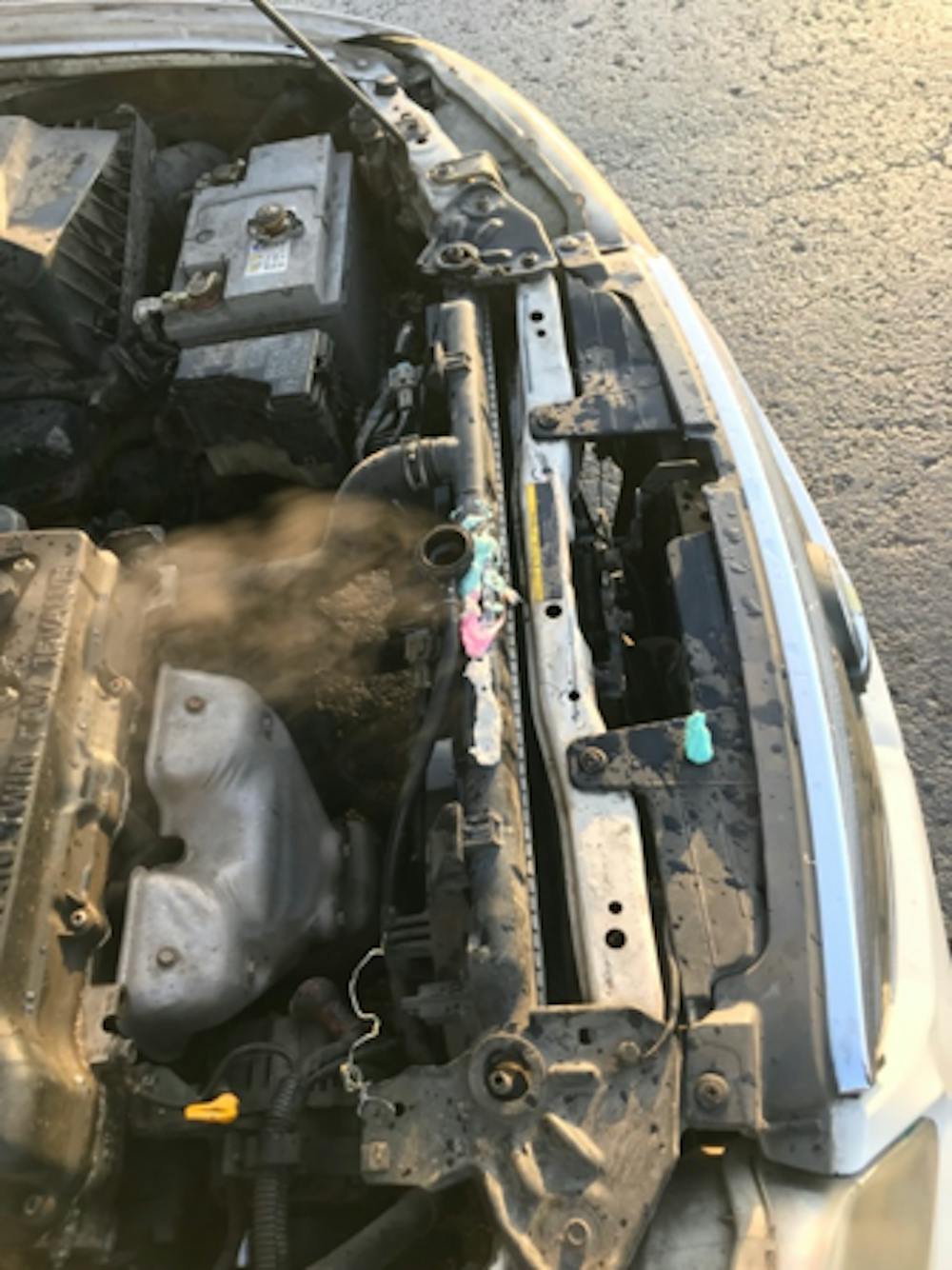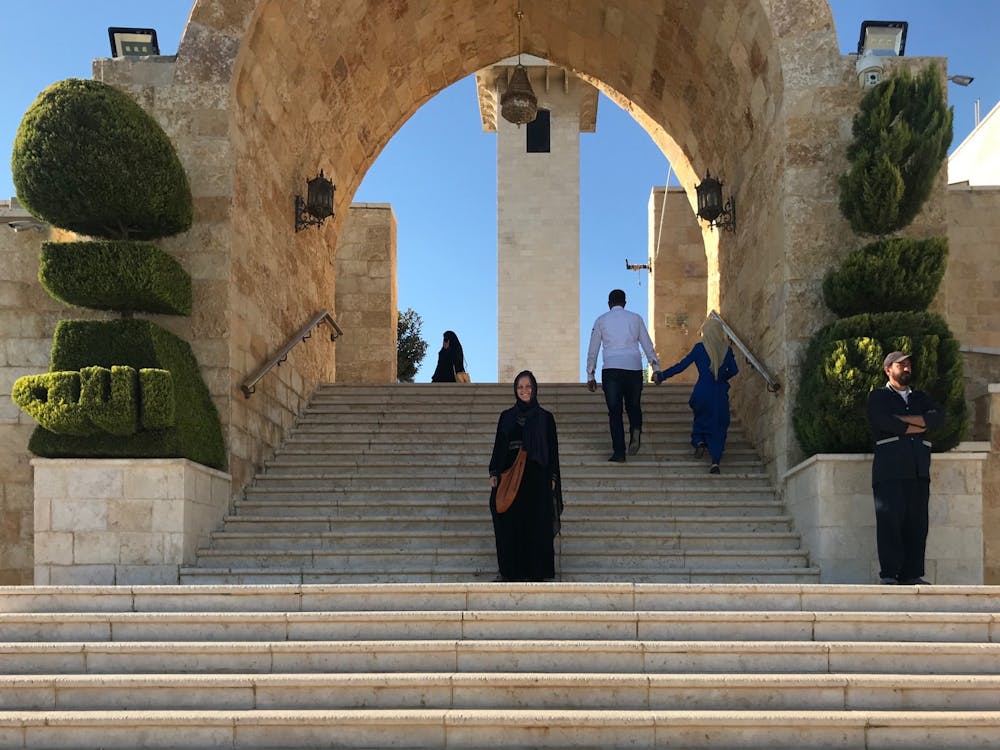Hey there, Spiders! My name is Addie Jo, and I’m currently spending my junior-year fall semester in Amman, Jordan.
In some ways, Jordan has been exactly what I expected it to be, but this place has taken me by surprise plenty of times as well. Here, you’ll find some stories and observations from my time in Jordan that I hope help explain my experiences.
Let’s talk taxis.
In Jordan, taxis are cheap and plentiful, and I use them daily to get to and from school. But there are important etiquette and behavioral rules for riding in Jordanian taxis that I had to learn. Here’s a quick summary: Check for a working meter, expect road rage and remember that there’s no such thing as traffic laws – those are really just traffic suggestions.
For women: Always sit in the backseat when possible, and never enter or exit the backseat from behind the driver (almost all of whom are male). And don’t chat with the taxi drivers.
If they ask you whether you’re married, I've started to say "yes." That way I can avoid follow-up comments, such as, “Do you want a Jordanian husband?” or, “I have a nephew who speaks good English” or, “You could be my second wife!”
And when it comes to Jordanian taxis, you should expect the unexpected.
Once, during a long taxi ride with two friends, our driver kept stopping the car to refill the radiator with water. Five minutes from our destination, the engine overheated. Our driver pulled the taxi over and handed each of us two five-piece packs of gum. “Eat!" he told us, "Eat! One for you and one for the car!” He then disappeared outside behind the car’s popped hood.
Confused, we hopped out to see what he was doing and found him patching a massive crack along the top of the radiator with chewed gum. Stifling hysterical laughter, we stuffed the gum into our mouths and contributed to the project.
And it worked. At least, it got us to our destination and him back to the nearest town to buy duct tape. It was freakin' awesome.

Crack in the radiator of a taxi patched with gum.
Through my eyes: a peek inside the Arab home.
Enjoy what you're reading?
Signup for our newsletter
If you ever wind up taxiing around Jordan, you’ll probably visit some Arab homes – or you ought to, anyway. In my limited life experience, Arabs have proven the most hospitable, generous people on the planet, and that’s coming from a U.S. Southerner.
As a guest in an Arab home, you’ll be given the most comfortable seats and bed, plied with more food than you could possibly eat and doted on relentlessly. Don’t be surprised if a good chunk of your host’s extended family shows up to meet you.
There are a number of social habits you’ll likely share in, such as eating sunflower seeds, drinking tea and smoking shisha (not to be confused with hashish).
The most important social activity of all, though, is drinking coffee. Now, I don’t actually drink coffee – for whatever reason, it makes my stomach hurt. But in Jordan, not drinking coffee is a thing that doesn’t exist. What do you mean, you don’t drink coffee? How can you not drink coffee?
At first, when making social calls on Jordanians, I’d try to refuse coffee when it was offered. And every time, the interaction went something like this:
Me (in Arabic): "No, thank you. When I drink coffee, I feel sick."
My host: "Oh, salamtik (an Arabic expression equivalent to 'feel better')."
They’d look at me with great concern and then immediately offer me the coffee again. In the end, I gave up trying to turn coffee down. My hosts were too kind and earnest and totally unable to imagine not drinking coffee. I could handle a few stomachaches.
The sunflower seeds were troublesome. I’d never learned to effectively shell a sunflower seed.
But there I was one day, visiting an Arab family, sitting in a room with at least 15 people all shelling sunflower seeds with what seemed to be superhuman speed.
I, meanwhile, would spend minutes trying to shell one seed before inevitably crushing it. After yet another failure, I glanced across the room and – no joke – watched a two-year-old successfully shell and eat a sunflower seed.
I turned to my new best friend, a very nice 10-year-old girl. Holding up a seed in my hand, I would ask in dejected Arabic, “How?!”
My friend spent an hour patiently training me to crack sunflower seed shells neatly in half with my teeth, amidst a great deal of good-natured laughter from both adults and kids watching my progress.
One of the aunties offered me some peanuts out of pity, but I was determined to learn. I’m proud to say that I can now shell sunflower seeds with great speed and grace, thank you very much.
Language.
The language barrier has kept my time here interesting, too. When I arrived in Jordan, I had enough Arabic to get by. But I was out of practice and I knew no "Amia" Arabic. Amia is the Jordanian colloquial dialect. Although Jordanians also know formal Arabic -- the only form of Arabic I had studied -- I couldn't easily understand Amia.
On the same night of the sunflower seed training, I grew uncomfortable with my apparent inability to connect more deeply with the family. I wanted to get to know them better, but I’d exhausted my vocabulary.
As it turns out, you don’t need a common language to connect with people.
We were smoking shisha, and I had both tried and failed to blow smoke rings. Muhammad, one of my host's younger brothers, laughed and started blowing perfect smoke rings with his cigarette smoke.
“What about this?” I asked in Arabic. I cocked one eyebrow, then the other.
Muhammad’s jaw dropped. Before long, everyone in the room – kids of all ages, mothers, uncles and even Tayta (i.e. "grandma”) – was crossing eyes, rolling tongues and performing crazy double-jointed tricks. Or, we were all attempting to.
Goofy personalities emerged, everyone was laughing and my limited Arabic was a distant memory for a time.
The U.S. from a Jordanian perspective.
On a different subject, here’s a way Jordanians really took me by surprise.
It seems to me that much of U.S. political rhetoric implies that people from other countries hate the U.S., are sick of the U.S., etc. When I arrived in Jordan, I didn’t expect locals to have warm feelings toward my home.
But almost every time my American nationality has come up in conversation with Jordanians, they’ve responded, “I love America! I hope to move there someday, God willing.”
My time in Jordan has been lovely, full of adventure and discovery, but I know that I don’t experience Jordan the same way the locals do.
I was born into a well-off family and American citizenship, and I’m blessed by the resources that come with that. If something goes wrong while I'm in Jordan, I can leave. If I’m in need, I have a stable support system.
Most Jordanians don’t have that.
They can’t just “go home to America” if they feel like it. Jordan has very few natural resources, unemployment is high and job opportunities are scarce. There are plenty of jobs available in Saudi Arabia, but moving to Saudi Arabia means sacrificing freedoms, especially for women. And although people in Jordan are freer than those in many other Arab countries, they still aren't as free as we are in the U.S.
Oftentimes, locals will ask me what I think of Jordan. “I love it,” I’ll reply in Arabic. “It’s so beautiful.” Some people, when they respond, will crack a disbelieving grin and say, “No, Jordan is no good. America is a good place.”
It reminds me that I’m quite lucky to call the U.S. home.
There is so much more to Jordan, and so many more stories to tell. But I hope these tidbits helped make Jordan feel a bit closer to home.
Contact international writer Addie Jo Quinlen at addie.quinlen@richmond.edu.
Support independent student media
You can make a tax-deductible donation by clicking the button below, which takes you to our secure PayPal account. The page is set up to receive contributions in whatever amount you designate. We look forward to using the money we raise to further our mission of providing honest and accurate information to students, faculty, staff, alumni and others in the general public.
Donate Now



